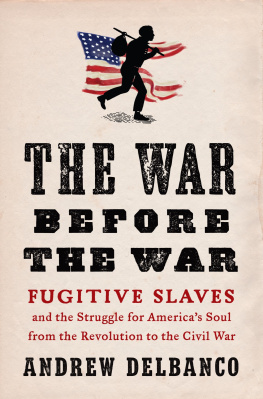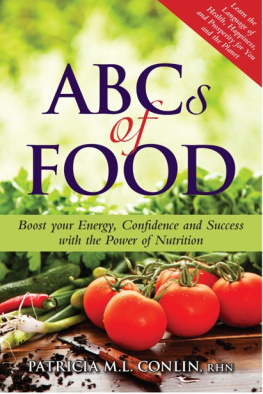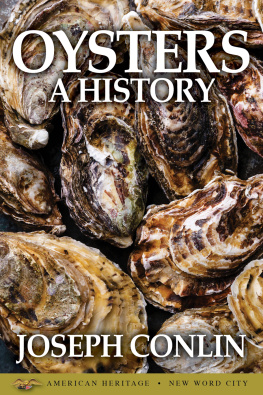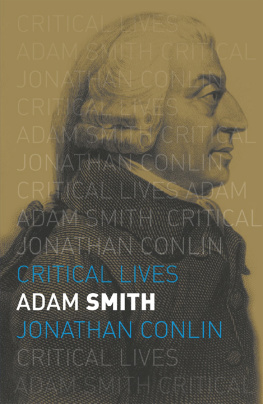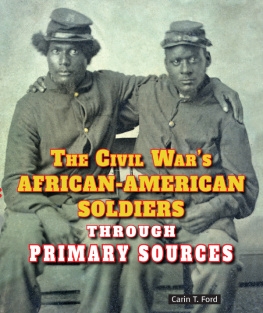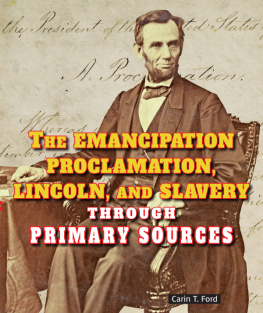ONE NATION DIVIDED BY SLAVERY
AMERICAN ABOLITIONISM AND ANTISLAVERY
JOHN DAVID SMITH, SERIES EDITOR
The Imperfect Revolution: Anthony Burns and the Landscape of Race in Antebellum America
GORDON S. BARKER
A Self-Evident Lie: Southern Slavery and the Threat to American Freedom
JEREMY J. TEWELL
Denmark Veseys Revolt: The Slave Plot That Lit a Fuse to Fort Sumter
JOHN LOFTON NEW INTRODUCTION BY PETER C. HOFFER
To Plead Our Own Cause: African Americans in Massachusetts and the Making of the Antislavery Movement
CHRISTOPHER CAMERON
African Canadians in Union Blue: Volunteering for the Cause in the Civil War
RICHARD M. REID
One Nation Divided by Slavery: Remembering the American Revolution While Marching toward the Civil War
MICHAEL F. CONLIN
2015 by The Kent State University Press, Kent, Ohio 44242
ALL RIGHTS RESERVED
Library of Congress Catalog Card Number 2014049004
ISBN 978-1-60635-240-3
Manufactured in the United States of America
LIBRARY OF CONGRESS CATALOGING-IN-PUBLICATION DATA
Conlin, Michael F., 1968 author.
One nation divided by slavery : remembering the American Revolution while marching toward the Civil War / Michael F. Conlin.
pages cm. (American abolitionism and antislavery)
Includes bibliographical references and index.
ISBN 978-1-60635-240-3 (hardcover : alk. paper)
1. Antislavery movementsUnited StatesHistory19th century. 2. United StatesHistoryRevolution, 17751783Influence. I. Title.
E449.C747 2015
326.8097309034dc23
2014049004
19 18 17 16 15 5 4 3 2 1
I became interested in the antebellum era during my first year in graduate school at the University of Illinois when my housemate and political science graduate student Jim Sopp lent me his copy of David Potters The Impending Crisis. I read it in a day and a half. From that time on, I have found the coming of the war far more interesting than the war itself or its desultory end in Reconstruction. While systematically reading the Washington (D.C.) Daily National Intelligencer for my dissertation, which charted how the Civil War influenced the research program of the Smithsonian Institution, I was intrigued by reports that antebellum Americans were erecting seemingly countless monuments to George Washington, Henry Clay, Daniel Webster, and other national figures in the late 1840s and throughout the 1850sat the very time when Northerners and Southerners were supposed to be galvanized into separate nations on the brink of an inevitable war. At that time, Harry Liebersohn introduced me to recent work on the invention of European nationalism when I served as his teaching assistant in a survey class on Western Civilization. Although the idea that Europeans had created their national stories was surely lost on most, if not all, of the undergraduates, it dovetailed nicely with the monument mania that jumped out at me from the pages of the National Intelligencer. I resolved to begin researching that topic as soon as I defended my dissertation and that is what I have done over the following fourteen years.
Although researching a book, especially one based primarily on archival materials, is largely a solitary activity, the assistance of outstanding archivists is absolutely necessary. I would like to thank the staffs of the William L. Clements Library at the University of Michigan, the Filson Historical Society, the Historical Society of Pennsylvania, the Maryland Historical Society, the Massachusetts Historical Society, the Missouri History Museum, the New York Public Library, the Rubenstein Rare Book & Manuscript Library at Duke University, the Small Special Collections Library at the University of Virginia, the South Caroliniana Library at the University of South Carolina, the Southern Historical Collection at the University of North Carolina, and the Wisconsin Historical Society at the University of Wisconsin. While I worked with numerous outstanding archivists, a few individuals merit individual praise: Barbara DeWolf and Clayton Lewis at the Clements Library; Shirley Harmon, Becky Rice, and Mark Wetherington at the Filson; Anna Clutterbuck-Cook, Peter Drummey, and Elaine Grublin at the Massachusetts Historical Society; Marc Thomas at the Maryland Historical Society; Brian Cuthrell, Sam Fore, and Henry Fulmer at the South Caroliniana Library; and Laura C. Brown at the Southern Historical Collection. As finding economical lodging within walking distance of the archives was my greatest logistical challenge, I would like to thank those who solved that problem for me: Jennifer R. Hannah of the Filson for finding me lodging in the dorms of Spalding University; Brian Cuthrell for putting me in contact with Tom Lekan, who generously allowed me to house-sit; Bruce Hall for the use his row house in Fells Point, Baltimore; and James Green of the Library Company of Philadelphia for getting me a room in the Mary Cassatt House. As researchers need good cheer as well as a place to stay, I greatly appreciated the Massachusetts Historical Society for inviting me to its Strawberry Festival; the Clements Library for taking the time to have tea every day; the repeated hospitality of Tracy and Tyler Batton, Scott Heyward and Tina Cavaluzzi, Jim and Tracey Sopp, which relieved me of the dreariness of hostels; and the tours of Manhattan and Brooklyn led by Matthew Friedberger.
I would like to thank the institutions that provided financial assistance for my research. The Filson Historical Societys C. Ballard Breaux Visiting Fellowship, the Gilder Lehrman Institute of American Historys Fellowship in American Civilization, the Maryland Historical Societys Lord Baltimore Research Fellowship, and the North Caroliniana Societys Archie K. Davis Fellowship, as well as two summer research grants and a year of sabbatical from Eastern Washington University helped to defray the expense and time of traveling two or three time zones and residing for a month to read and transcribe archival manuscripts by day and read newspapers on microfilm by night.
As a scholar I have incurred many intellectual debts at the University of Illinois and Eastern Washington University. I am grateful for the outstanding mentors I had at the University of Illinois. By sending me to the Newspaper Library for twenty hours a week as his research assistant, Daniel Littlefield introduced me to newspapers as a rich primary source, the historical significance of colonial and early national slavery, and my wife Stephanie. I also served as research assistant for Winton Solberg and my Ph.D. advisor Robert Johannsen: from the former I learned to be careful in my research and writing and unstinting in my industry; from the latter I learned to love the mid-nineteenth century and to aspire to write simple, direct, and fluid prose. John Hoffmann offered historiographical assistance and unflagging encouragement. My students and colleagues in the History Department and the College of Social and Behavioral Sciences and Social Work at Eastern Washington University have been supportive. A few merit special recognition: Bryan Carter, Larry Cebula, John Collins, Kathleen Huttenmaier, Ann LeBar, Joseph Lenti, Joel Martin, Nicole Montgomery, Edward Slack, Vickie Shields, Paul Warden, Gerry Wilson, and Bill Youngs.




